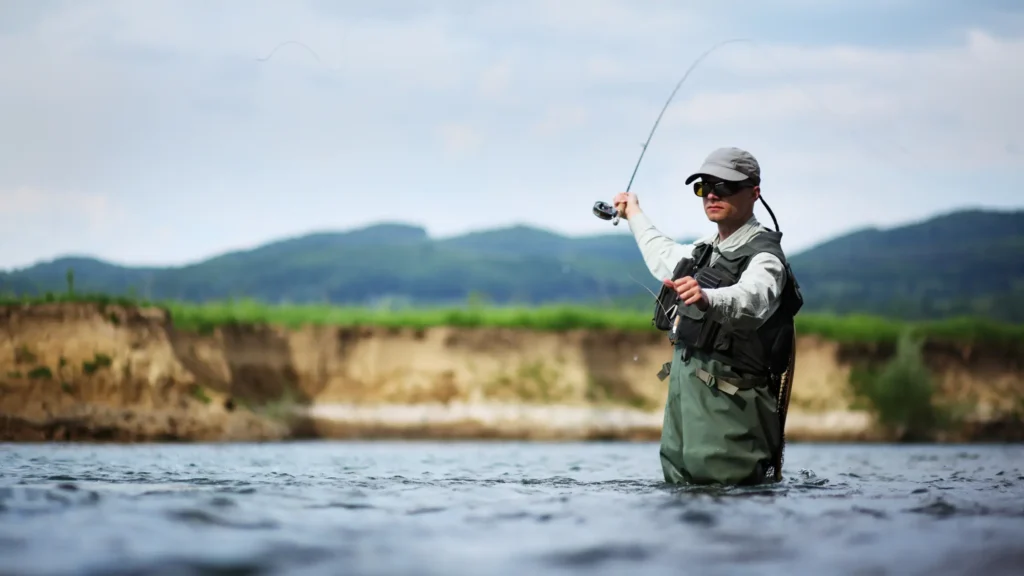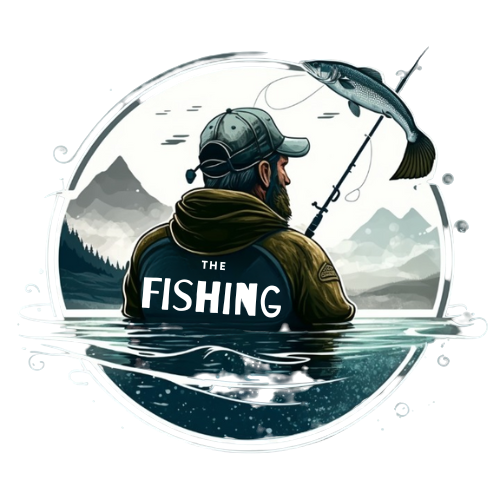I remember the first time I went fly fishing. I had always been interested in the sport, drawn to its elegance and precision.
So when the opportunity arose, I jumped at it. That first day on the river was a humbling experience.
The graceful casting motions that I had admired from afar turned out to be much more difficult than they looked. My line was tangled, my flies were lost in trees, and my frustration levels were rising rapidly.
As I trudged back up the riverbank, soaking wet and empty-handed, I couldn’t help but wonder: is fly fishing hard to learn? Was my failure just a fluke, or was there something about this sport that made it inherently challenging?
Table of Contents
- The Question of Difficulty
- Is fly fishing harder than regular fishing?
- How long does it take to become proficient at fly fishing?
- How often should one practice to become proficient?
- What equipment is needed to start fly fishing?
- What are some common mistakes beginners make when learning fly fishing?
- How to read the water when fly fishing?
- FAQs
- Conclusion
The Question of Difficulty

It’s a question that many people have asked themselves when considering taking up fly fishing. On one hand, there’s plenty of evidence that suggests it can be a difficult skill to master. The intricate casting techniques, complicated equipment, and ever-changing environmental factors all contribute to a steep learning curve.
However, there are also plenty of stories from seasoned anglers who claim that anyone can learn how to fly fish with enough practice and dedication. They argue that while there may be some initial struggles along the way, the reward of catching a fish on a fly rod makes it all worthwhile.
So which is it? Is fly fishing hard to learn or not?
Yes, fly fishing hard to learn for beginners. As someone who has experienced both sides of this debate firsthand, I believe there’s no easy answer. The truth lies somewhere in between – while certainly challenging at times, mastering the art of fly fishing is ultimately achievable for anyone with enough passion and perseverance.
Is fly fishing harder than regular fishing?
Fly fishing can arguably be considered harder than regular fishing, but it largely depends on the individual’s skill level, experience, and personal preference. Both types of fishing have unique techniques and challenges, but there are several reasons why fly fishing might be seen as the more difficult of the two.
Fly fishing requires a higher level of technical skill and precision. While regular fishing involves casting a weighted lure into the water and waiting for a fish to bite, fly fishing requires the angler to create the illusion of a natural insect on the water’s surface. This is done by using a lightweight, artificial fly and a special casting technique that allows for controlled and accurate placement of the fly.
How long does it take to become proficient at fly fishing?
Becoming proficient at fly fishing can widely vary from person to person and largely depends on individual factors such as learning capability, dedication, and patience. In general, one may become proficient at fly fishing anywhere between four to six weeks or more.
For some individuals, grasping the basics of fly fishing, like tying knots and casting, may come quickly within a few months of focused effort. These people might also invest in private lessons, participate in fishing workshops, or practice regularly with experienced fishing companions.
Fly fishing is an art form that requires patience, skill, and knowledge of the environment and the behavior of the fish you are trying to catch.
There are several factors that will influence the time it takes to become proficient:
- Interest and dedication: If you have a genuine interest in the sport and invest time in learning and practicing, you are likely to become proficient faster than someone who is not as dedicated.
- Previous experience: If you already have some fishing or angling experience, you may have an easier time picking up fly fishing techniques and become proficient quicker.
- Access to resources: Having access to proper equipment, knowledgeable mentors, and good fishing locations will contribute to your progress in becoming proficient.
- Learning from the experts: Attending workshops, classes or joining a fly fishing club can exponentially increase your learning curve by exposing you to experienced anglers who can share their tips and tricks on fly fishing.
- Adaptability and willingness to learn: Being open to learning and adapting to different techniques and conditions will help you improve your skills and become proficient faster.
How often should one practice to become proficient?
The frequency of practice needed to become proficient depends on the skill or activity, the individual’s goals, and their current level of expertise.
In general, practicing consistently and regularly (for example, multiple times a week or even daily) is important for building proficiency.
It is also helpful to spend time on focused, deliberate practice, which involves breaking down the skill into smaller parts and working on specific aspects. Remember that each person’s learning pace may vary, so it is crucial to tailor the practice schedule to one’s personal needs and progress.
What equipment is needed to start fly fishing?
To begin fly fishing, you will need a variety of equipment, including a fly rod, fly reel, and fly line, which are essential components for casting your line and luring fish.
Additionally, you should invest in some quality flies, as these artificial lures come in an array of designs and sizes to match the insects that fish naturally feed on.
A tapered leader and tippet are necessary for connecting the fly line to the fly, and they also help with accurate casting and presentation.
A sturdy pair of waders and wading boots are crucial for navigating through different types of water, while a fly fishing vest or pack provides storage for your gear and accessories.
Polarized sunglasses protect your eyes from glare and harmful UV rays and also make it easier to spot fish beneath the water’s surface.
Lastly, some basic tools like forceps, nippers, and a net will come in handy for removing hooks and handling fish throughout your fly fishing adventures.
What are some common mistakes beginners make when learning fly fishing?
As you may know fly fishing not easy to learn for begginers, here are the 10 common mistakes that make when learning fly fishing:
1. Poor casting technique: Beginners often struggle with casting, leading to tangled lines or ineffective casts. It’s essential to practice proper casting techniques, including timing, wrist movements, and stopping the rod at the correct positions during the cast.
2. Using the wrong equipment: Choosing the wrong rod, reel, line, or fly can hinder the learning process and make catching fish more difficult. Beginners should research appropriate gear for the type of fishing conditions and species they plan to target.
3. Notmatching the hatch: Beginners often neglect to choose their flies based on the types of insects that are present in the area and being consumed by the fish. Matching the hatch is key to attracting fish to your flies.
4. Improper fly presentation: Common mistakes include dragging the fly through the water or not allowing it to drift naturally. Proper presentation means casting the fly in a way that mimics natural insect behavior, which encourages fish to strike.
5. Not understanding fish behavior and feeding patterns: Beginners may not know how to read the water or interpret fish behavior, and thus may struggle to identify the best spots to cast their flies.
6. Inadequate knot tying: Weak or improperly tied knots can lead to lost flies, broken lines, and lost fish. It’s essential to learn and practice strong knots for attaching flies and joining lines.
7. Poor wading technique: Beginners may not know how to wade safely and efficiently, putting themselves at risk for injury or scaring away fish. Learning proper wading technique is important for successful fly fishing.
8. Handling fish incorrectly: Beginners may not know how to properly handle hook removal and safe fish release, which can result in harm to the fish. Learning proper catch-and-release techniques is crucial to preserving fish populations and ecosystems.
9. Lack of patience and persistence: Fly fishing requires patience, practice, and concentration. Beginners sometimes become discouraged if they don’t catch fish immediately, which can hinder their progress in learning and improving their skills.
10. Neglecting to practice: Like any skill, fly fishing requires practice to develop proficiency. Beginners should invest time in practicing casting, knot tying, and other essential skills to hone their abilities and become more successful on the water.
How to read the water when fly fishing?
Reading the water while fly fishing is an essential skill for anglers who want to increase their chances of success. To read the water effectively, it means to understand and interpret various features of a river, stream or other water bodies that can indicate the presence of fish and their feeding habits.
First and foremost, learn to observe the current of the water, as fish usually face upstream waiting for passing meals. Identify the different types of currents, including riffles, runs, and pools. Riffles are shallow, faster-moving water areas that have a choppy surface.
They usually contain oxygen-rich water and provide excellent habitat for insects, making them a perfect spot for hungry fish. Runs are deeper and slower than riffles, but still moving faster than pools. They are great feeding lanes and can hold fish in many different species. Pools are the areas with deep, still water, often offering a resting place for fish after feeding.
Another critical aspect of reading the water in fly fishing is understanding the seams or the transition zones between different water speeds. Fish often hold in these seams because they offer a perfect balance between energy conservation and feeding opportunities. Look for the foam lines or bubble lines – these areas carry insects and act as “conveyor belts” for food, making them prime feeding areas for fish.
FAQs
Can I teach myself fly fishing?
Yes, you can certainly teach yourself fly fishing by following a few key steps and being patient in the learning process. Research and gather information on fly fishing techniques, gear, and safety. Once you are familiar with the basics, gradually progress to more advanced techniques, while also learning about local fishing regulations and suitable locations for fly fishing.
Why is fly fishing so complicated?
Fly fishing may seem complicated due to several factors, such as the need for specialized equipment and knowledge, different techniques, and an understanding of fish behavior. The learning process demands mastering various casting methods, knot-tying, and choosing the right flies to attract fish, which may appear overwhelming initially.
What type of fly fishing is easiest?
Dry fly fishing is considered the easiest form of fly fishing, as it involves presenting an artificial fly on the water’s surface, imitating insects or other natural prey. This method allows for more straightforward casting and better visibility, making it more beginner-friendly compared to other techniques.
Conclusion
The question is fly fishing hard to learn? remains subjective, as it is influenced by individual experiences, learning capabilities, and dedication to the sport. While it is undeniable that fly fishing presents a steep learning curve and numerous complexities, committing oneself to practice and consistently improve can lead to mastery in the art.
